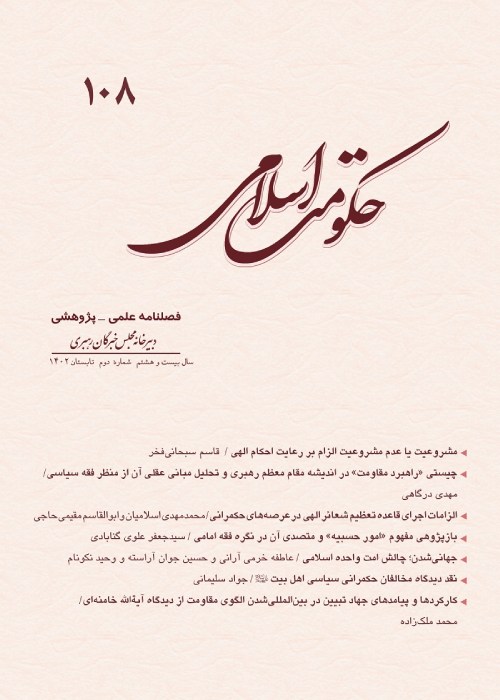A Systematic Study of Fiqh Based on Legal Addresses (Khitābāt-e Qānūniyyah)
Fiqh is a systematic discipline which is used as a means of deducing canonic rules from religious sources for a social life of a person who is subject to legal obligation (mukallaf ). The idea that the discipline of fiqh is of some effects on the social life of people can be studied under two views based on Islamic jurisprudence and principles of Islamic jurisprudence. The first view is widely accepted by the scholars of the Principles of Jurisprudence and is known among them as the dissolutionist theory of legal addresses of the legislator. According to this theory, the particular or singular as well as the general or universal addresses of the legislator can be dissolved or disintegrated into addresses equal to the number of legally obliged people. It seems that this idea is led to individual jurisprudence in terms of its subject and judgement (ruling). In contrast, Imam Khomeini's theory of legal addresses cannot be dissolved or disintegrated into individual or singular addresses in proportion to the number of people subject to legal obligation, but the addresses have remained as general or universal. However, what can be counted as having the real multiplicity or numerous instances is the object of legal addresses. This theory is of many consequences, including the disappearance of the relation between the servant (Ýabd ) and Master (MawlÁ ) in social matters, serving the interests of the human beings in line with requirements of time and place, the legislator's mawlavi's will in relation to the issues of addresses is directed to the will to lay down laws and not to the will to motivate somebody to act on the laws (baÝth), the idea that deducing "power" in fulfilling an obligation is not a stipulation and that all the parties of indefinite knowledge(Ýilm-e ijmÁli ) of obligation are to be involved in thinking whether an obligation is a categorical imperative or not. The writers of the article hold that the theory of legal addresses provides a capacity in the field of governmental and social fiqh which allows for speaking of obligation and the social obligated people.
- حق عضویت دریافتی صرف حمایت از نشریات عضو و نگهداری، تکمیل و توسعه مگیران میشود.
- پرداخت حق اشتراک و دانلود مقالات اجازه بازنشر آن در سایر رسانههای چاپی و دیجیتال را به کاربر نمیدهد.


